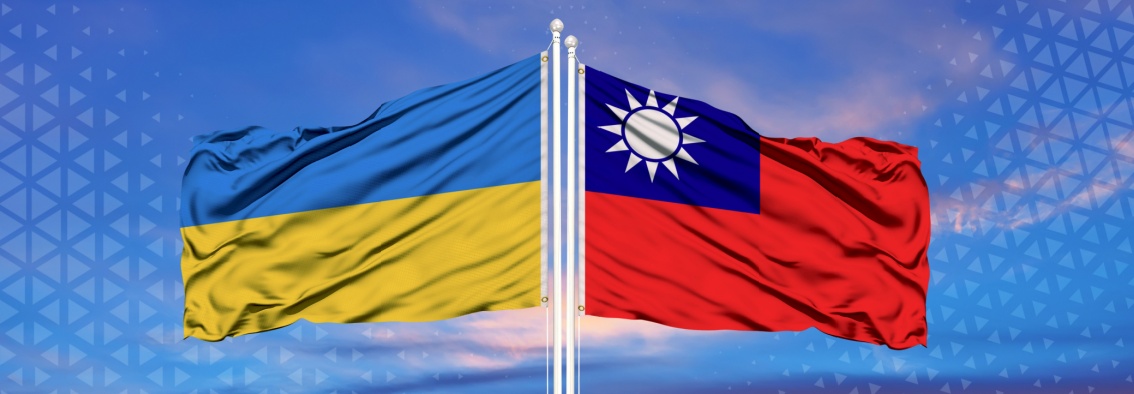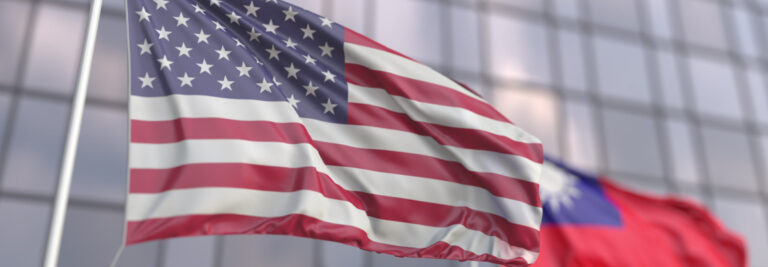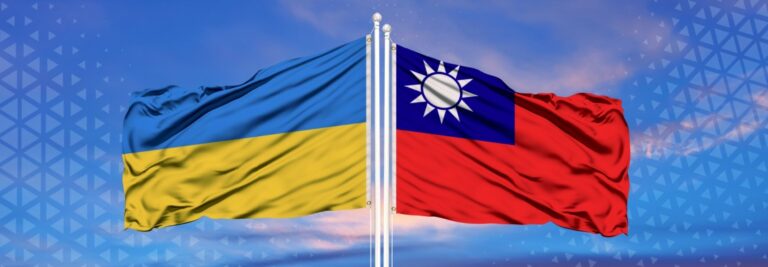Security analysts, policymakers, and human rights advocates flocked to Taipei in late February 2025, as the city played host to two major conferences—as well as a slew of smaller talks, workshops, and documentary screenings. In the space of a week, the 2025 Halifax International Security Forum (HFX Taipei) and RightsCon 2025 took place in Taiwan’s capital. The former event featured hundreds of delegates from over 70 countries, and was sponsored by Robert Tsao, founder of United Microelectronics Corporation (UMC, 聯華電子)—Taiwan’s second biggest dedicated semiconductor foundry after Taiwan Semiconductor Manufacturing Company (TSMC, 台灣積體電路製造股份有限公司), and the world’s fourth largest pure-play operation.
Given that, less than two weeks after HFX Taipei, TSMC CEO and chair C.C. Wei (魏哲家) announced at a joint press conference with US President Donald Trump that the company would be investing a further USD $1 billion in its Arizona facilities, the backing of Taiwan’s chip manufacturing magnates for a security-focused forum makes sense. Along with Tsao, Taiwan President William Lai (賴清德) spoke at the opening ceremony for HFX Taipei, emphasizing that Taiwan’s technology advantages were the “backbone” for its security.
Also present were Taiwan’s Minister of Foreign Affairs Lin Chia-lung (林佳龍) and Minister of National Defense Wellington Koo (顧立雄), as was Halifax International Security Forum President Peter Van Praagh, who noted that the choice of Taipei for this year’s event—the first to be held outside North America—was deliberate, given the threats that Taiwan faces: “Taiwan is a vital democracy whose continued freedom and security is important not only to the people of Taiwan but to the security of the entire world.”
At RightsCon 2025, an estimated 3,000-plus participants and attendees gathered for more than 550 sessions across 18 different themes, via formats that included “fireside chats, hands-on workshops, strategic roundtables, private meetings.” Echoing Van Pragh’s remarks, Alejandro Mayoral Baños, executive director of Access Now, the event’s organizer, said that bringing RightsCon to Taiwan was “a natural step.”

Image: Taiwan President William Lai greets Halifax International Security Forum President Peter Van Praagh at the opening of the 2025 Forum in Taipei (February 20, 2025). (Image source: ROC Presidential Office)
Conversations about Ukraine
With the events held just before the third anniversary of Russia’s full-scale invasion of Ukraine, the issue of parallels and lessons learned inevitably loomed large. The controversial February 28 meeting between Trump and Ukraine’s President Volodymyr Zelenskyy had yet to take place, but—based on the US president’s apparent insistence that Kyiv accept his minerals deal without specific security guarantees—the implication was clear: Taiwan cannot just sit back and take US support for granted. “Before you expect someone to give you a hand, you need to help yourself,” said Tsao at the HFX Taipei opening. This, he stressed, would require unity and understanding across society to combat Chinese hybrid threats to Taiwan—in other words, Taiwan needs to cultivate “whole-of-society resilience,” to use the Lai Administration’s concept of civil-government integration.
In this regard, Taiwan and Ukraine have a lot to offer each other in terms of shared experiences. This was emphasized in various speeches and sessions at both HFX Taipei and RightsCon. It was further exemplified at a series of accompanying events organized by think tanks, nongovernmental organizations (NGOs), civil society organizations (CSOs), and local activists designed to bolster solidarity between the two countries and share best practices.
On a chilly Sunday afternoon, sandwiched between the two main conferences, a demonstration took place outside Russia’s representative office in Taipei, organized by Taiwan Stands with Ukraine (TSWU), a Taipei-based group of Ukrainian, Taiwanese, and international volunteers. Activists and media gathered at the site opposite the Taipei International Convention Center where RightsCon would take place the following day—also the third anniversary of the full-scale invasion. Addressing the gathering was Ukrainian journalist Nataliya Gumenyuk, a Ukrainian writer and journalist and cofounder of the Public Interest Journalist Laboratory (PIJL), an NGO that brings together reporters, academics, and researchers to foster dialogue on complex social issues.
Gumenyuk noted that walking the streets of Taipei reminded her of the freedoms Ukrainians “share and cherish” in their own now beleaguered cities, and highlighted the shared values between Ukraine and Taiwan: “Our way of life, our democracy, our pluralistic society, our incredible people who know themselves who they want to elect, the various views we have in our country, the way we think about the world, who [our] partners and allies are.” Thanking Taiwan for its support, Gumenyuk said the message she had received in Taiwan was “how much we have to defend, how much we have to protect,” and how “that should empower us.” [1]
Also present at the demonstration was Olena Tregub, a Ukrainian civil society leader, who had responded to Trump’s characterization of Zelenskyy as a dictator with a powerful defense of Ukraine’s democracy during a plenary session at HFX Taipei. “From the first minute I landed here in Taipei, I saw how close you are to us Ukrainians,” said Tregub, executive director of the Kyiv-based Independent Anti-Corruption Commission (NAKO), which tackles graft in areas critical to Ukraine’s defence and national security. “You have freedom here; you have liberty here; you have free speech here; and you have a kind heart. You understand that strongmen, dictators, people who have nuclear weapons … cannot intimidate you into submission, into becoming what they want you to be.” [2]
Taiwan’s and Ukraine’s Shared Problem of Disinformation
Part of Tregub’s work has been focused on combatting disinformation—a key area of concern for government and civil society in both Ukraine and Taiwan in recent years. At a discussion and documentary screening the evening after the TSWU protest, PIJL cofounder Angelina Kariakina highlighted how Ukraine is attempting to instill public trust in reporting of the war. Her talk introduced The Reckoning Project, a multimedia archive of witness testimonies on Russian war crimes in Ukraine.
Based on experiences of international courts dismissing testimonies recorded by journalists “due to discrepancies between legal and journalistic modes of investigation,” the project aims to document alleged war crimes “according to the methodology that makes them applicable for litigation.” To achieve this, the project has cooperated with lawyers and war crime investigators with experience of atrocities in Syria, Chechnya, Rwanda, and Bosnia. Emphasizing that their approach was not to “persuade you [of] anything,” Kariakina said that giving a voice to the victims and witnesses of these events was part of the justice process. “It’s up to you to decide what to believe in and what kind of idea to have about these terrible events,” she said. [3]
Kariakina also spoke about how public access to timely and trustworthy information can be problematic in a war. She gave the example of the city of Mariupol in the occupied territory of Donetsk Oblast—which fell to Russian forces in May 2022 after a nearly three-month siege that saw at least 8,000 civilians killed, over 90 percent of the city’s buildings damaged or destroyed, and an estimated 350,000 people forced to leave their homes. Taking advantage of the power cuts that kept the city blacked out for weeks on end, the occupying Russian forces set up cell phone charging points in vans brought into the city’s central square.
As the vehicles also contained televisions broadcasting Russian state networks, this was an obvious ploy to expose people to propaganda. “They were saying that Kyiv is already taken, Ukraine does not exist, blah, blah, blah, and of course, it demoralized people,” says Kariakina. “But at the same time, we witnessed a huge growth in messenger news—Telegram is the number one.” While people have become wary that the medium may have been compromised, it remains “the first source” of information for many Ukrainians.
Analysts in Taiwan have previously noted that the more secure Telegram and Signal, which feature the best encryption, enjoy low market penetration in Taiwan. Meanwhile, China-developed apps such as TikTok and WeChat have more than five million users each as of 2024. Both apps are heavily monitored by the Chinese authorities, leading Taiwan’s security experts to express concerns over information flow, particularly in the event of an invasion by China’s People’s Liberation Army. For this reason, some analysts recommend Taiwan’s authorities pay more attention to low-tech communication channels, such as radio. “Even people under occupation in Ukraine could get [radio broadcasts], so it’s important to bear in mind that you might have to go back to these practices from many years ago.”

Image: Taiwan Vice-President Hsiao Bi-khim (蕭美琴) (center right), Vice Premier Cheng Li-chun (鄭麗君) (center left), and other attendees at RightsCon 2025, held in Taipei in February. (Image source: ROC Foreign Ministry)
Shared Practices for Democratic Resilience
But perhaps the standout event, in terms of practical value, was a workshop on Taiwan-Ukraine shared best practices for democratic resilience organized by the PIJL and hosted at the Czech Hub in Taipei. This space for discussion and implementation of joint semi-governmental projects was co-founded in 2023 by the Czech-Taiwanese Business Chamber and the European Values Center for Security Policy, which in 2022 became the only European think tank with a permanent presence in Taiwan. Offering their experiences were representatives from Taiwanese and Ukrainian CSOs and NGOs, think tanks, civil defense organizations, and independent media. Participants from the Department of International Collaboration under Taiwan’s Ministry of Digital Affairs were also involved.
Ukraine’s constitutionally mandated and reasonable suspension of elections during martial law—which was the basis of Trump’s “dictator” claim—was discussed, as were restrictions on and challenges to reporting, which has sometimes seen Ukrainian journalists at loggerheads with the government. Given Taiwan’s own history with suppression of free speech and government propaganda during the 40-year martial law period under the Chinese Nationalist Party’s authoritarian rule, such issues have particular resonance for Taiwanese.
In handling its own “Ukrainian moment,” Taiwanese might face a dilemma regarding the roles of civil society and government, said Raymond Sung (宋承恩), vice president of The Prospect Foundation (遠景基金會), a government-affiliated think tank focused on Taiwan’s foreign policy. “People have to choose whether we can organize ourselves as citizens in civil societies and how and whether we strengthen our defence forces to protect ourselves or opt for a stronger government state,” said Sung. [4]
Despite myriad positive developments across the week’s events, the issue of the Trump Administration’s pivot away from support for Ukraine and the dismantling of USAID cast a shadow. Following the Trump-Zelenskyy debacle, which came the day after the best practices workshop, Taiwanese and Ukrainian experts and officials offered their thoughts on what the rift might portend, given Taiwan’s traditional alignment with Washington.
While declining to comment directly on the Trump Administration’s potential influence on Taiwan’s official policy, Chen Kuang-ting (陳冠廷)— a legislator with the ruling Democratic Progressive Party, as well as the CEO of Taiwan NextGen Foundation, a non-profit that has focused on Taiwan’s soft power—called for unity among democracies in support of Ukraine. “We cannot have division among our partners; we cannot undermine these allies and coalitions,” said Chen. “We are for international law; we are for international order; and we are for the idea that a state cannot initiate a war without just cause.” Regarding nongovernmental ties, Chen also expressed concern. “How Washington’s policy influences [Taiwan’s] NGOs is hard to say,” he says. “But I would say it definitely has implications.” [5]
Makarovych agrees, “we don’t hear a very loud statement from Taiwan about Ukraine right now [following the February 28 Trump-Zelenskyy meeting],” she says. Such caution is understandable, “because they need to understand how political changes can influence their security and their partnership with the United States.” However, she notes that MOFA has already published a statement on continued support for Ukraine. “I think that this is the most important point in this matter,” she said.
As for CSOs and NGOs, Makarovych fears for smaller initiatives, which provide vital links to communities that larger, international organizations cannot always reach alone. “Without proper funding of smaller NGOs working on information or bigger infrastructure projects, we face a really dangerous situation, not only in Ukraine but worldwide.” [6]
Despite these potential obstacles, participants in the events in Taipei over the course of the week were encouraged, both by the spirit of solidarity between Taiwan and Ukraine and the focus on practical measures for safeguarding democracy against authoritarian aggression. While official policy will inevitably be influenced by developments in Washington, Taipei understands that Ukraine’s fate has implications for Taiwan. As such, it should continue its steadfast support for Kyiv.
The main point: The 2025 Halifax International Security Forum, and RightsCon 2025 international conference, were both held in Taipei in February 2025. In addition to these two international forums, a series of smaller events provided opportunities for participants—particularly those from Ukraine and Taiwan—to discuss their experiences of resisting authoritarian pressure, and to share best practices for building democratic resilience.
[1] Part of a speech delivered at Taiwan Stands With Ukraine event in Taipei, February 23, 2025.
[2] Part of a speech delivered at Taiwan Stands With Ukraine event in Taipei, February 23, 2025.
[3] Part of a discussion introducing the work of the Public Interest Journalism Lab at Daybreak café and event space in Taipei, February 24, 2025.
[4] Part of a discussion at a workshop Ukraine-Taiwan shared best practices for democratic resilience at Czech Hub in Taipei, February 27, 2025.
[5] Online interview conducted March 5, 2025.
[6] Online interview conducted March 5, 2025.





